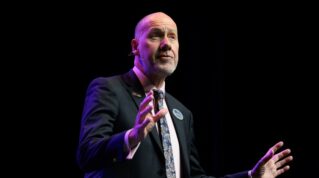Headteachers fearing “bankruptcy” as spiralling costs outstrip school funding should use government cost-cutters or approach its funding agency or their local council for help, a senior official has said.
Graham Archer and Tom Goldman, from the Department for Education, this afternoon led a webinar – attended by 850 people – about the funding cycle and teacher pay.
The government has claimed a 4 per cent pay rise for teachers and leaders next year will be affordable from within existing school budgets thanks to a £2 billion uplift in funding pledged at the autumn statement.
But organisations representing school leaders and academy trusts have warned that the reality will be different for many institutions.
In a sign of the desperation in the sector, one anonymous question, which received over 50 “upvotes” in the webinar Q&A panel, asked: “What happens if schools run out of money? Can we actually go bankrupt? I’m afraid most single maintained schools in our area will be in that position.”
Goldman, deputy director of the DfE’s funding policy unit, said there were “two things I think to say about that”.
“The first is to suggest people do try and make use of the quite extensive school resource management support that the department offers in helping people set their budgets as efficiently as they can and looking for good deals, particularly in non-pay areas.”
DfE accepts schools face ‘real challenges’
School resource management advisers (SRMAs) have been visiting schools since 2018 as part of a cost-cutting drive under then-academies minister Lord Agnew.
But Goldman added: “We recognise every year there are some schools which face real financial challenges. And further support can be offered to schools who are in that most tricky situation.”
Academies, he said, should go to the DfE’s Education and Skills Funding Agency “if they fear that they are really facing a major financial crunch like this”.
“Maintained schools’ situation is kind of the same except for it’s the local authority obviously for a maintained school who can provide additional support in the most extreme cases.”
On top of the funding allocated at the autumn statement, the government also pledged in last month’s pay offer an extra £620 million in funding to take the average pay rise to 4.5 per cent next year.
They also committed a one-off £1,000 payment for all teachers and leaders in this academic year.
‘We don’t know better than heads’
However, this was rejected by unions, and the offer has since been withdrawn by the government.
Civil servants were asked about polling by the NAHT school leaders’ union of its members, which found 92 per cent of those asked said the pay rise would be unaffordable in their budgets.
“Are you saying that [headteachers] are wrong?” the question asked.
Archer, the DfE’s director of strategic policy, said: “We are not saying and would not say that we know better than headteachers what the position is in their individual schools.
“What we are saying is that, on average, using the methodology that we use year on year, our assessment is that there is sufficient in the budget including the [additional grant funding] allocations that have been made today to make a 4 per cent pay rise affordable.
“As Tom has also said, the department committed to making more money available for the additional half percent we offered to the teaching unions and the £1,000 pound non consolidated award in the current year.
“So that is what we are saying. We are clearly not saying that we know better than every individual headteacher what the position is in their individual school.”









SRMA reviews are the failed policy of a incompetent buffon aka Lord Agnew who preached efficacy and cost cutting to Academies whilst giving £200MN contracts for defective PPE to his chum Lady Moan
I’m not clear on how this works, is this referring to publicly funded schools? I understand that costs can rise, but how can a publicly funded body go “bankrupt?” As bankruptcy implies a liquidation of all assets. Are the schools given a set budget then left to how to spend it?